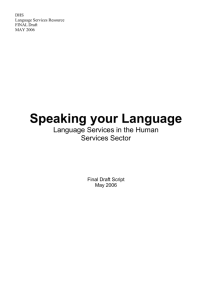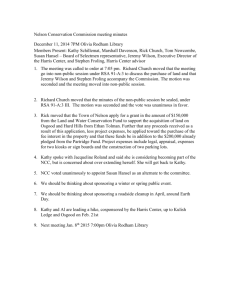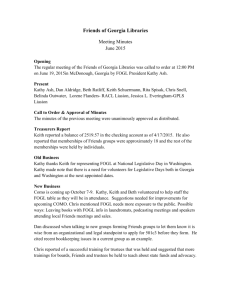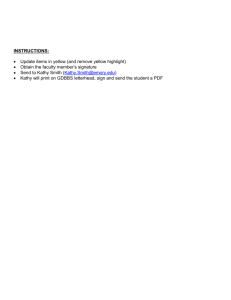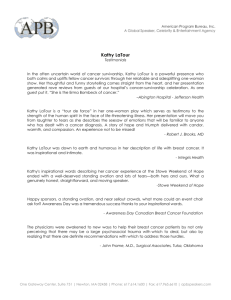UCB - Education and Democracy
advertisement
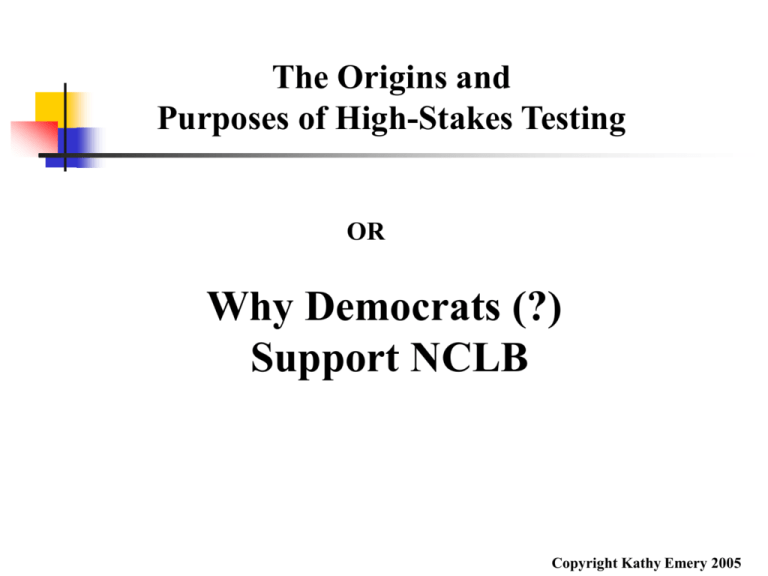
The Origins and Purposes of High-Stakes Testing OR Why Democrats (?) Support NCLB Copyright Kathy Emery 2005 1989 Business Roundtable’s Annual Meeting Agree to transform public K-12 education around The following “goals” • OUTCOME-BASED EDUCATION • HIGH EXPECTATIONS FOR ALL • STRONG AND COMPLEX ASSESSMENTS • REWARDS AND PENALTIES Copyright Kathy Emery 2005 1995 Business Roundtable’s Publication Nine Essential Components of a Successful Education System • State content standards • State mandated tests • Rewards and sanctions • Site-based decision making • Professional development • Learning readiness • Parent Involvement • Technology • Safety and Discipline Copyright Kathy Emery 2005 National BRT engineers “alignment” 1989 to 2001 ECS AFT Co-opt governors STATE BRTs Lobby state legislatures Co-opt teacher unions BCER Coalition of 13 national business organizations National BRT PUBLIC AGENDA Feed newspaper reporters story lines ED TRUST • Attack opponents of highstakes testing as racist • Co-opt school counsellors CORPORATE FOUNDATIONS Set up new and co-opt existing research institutes at universities Copyright Kathy Emery 2005 American Federation of Teachers (from 1996 BRT publication, A Business Leader’s Guide to Setting Academic Standards) “Examples of Ineffectual, Unclear or Poorly Written Standards: The following selections of standards are cited by the American Federation of Teachers as examples of what to avoid. The AFT criticizes these standards for being confusing, not academic enough and overly focused on skills at the expense of knowledge . . . . Many of the standards below met objections from members of the public and business community and were rewritten as a result.” “Students will demonstrate the ability to examine problems and proposed solutions from multiple perspectives” (Missouri’s Standards, Draft, 1995). Education Commission of the States 1999 “ECS Priorities”: State system of high standards and assessment , incentives, rewards and sanctions Data must be disaggregated so no student falls through the cracks Flexibility with de-centralized decision-making, charter schools, and collaborate with federal government’s Comprehensive School Reform Demonstration Project Education Trust A “non -partisan, non-profit” organization branding any OPPONENT of high-stakes testing AS RACIST! • • • • “Achievement gap” rhetoric College-prep curriculum for all K-16 alignment through high school exit exams “In June 2003, the Education Trust and MetLife Foundation established the National Center for Transforming School Counseling (NCTSC). This new Center continues the work supported by the Dewitt Wallace-Reader’s Digest Fund and MetLife Foundation to ensure school counselors across the country are trained and ready to help ALL groups of students reach high academic standards.” (from website) How to Handle the Backlash? By 2001, only 16 state legislatures had passed high-stakes testing legislation BRT PUBLISHES “HOW TO” MANUAL Addressing and Assessing the “Testing Backlash”: Practical Advice and Current Public Opinion Research For Business Coalitions and Standards Advocates WHY NCLB??? Eugene Hickock, Under Secretary of Education, at 2003 Milken Global Conference Leverage to fundamentally change public education “ One of the virtues of NCLB is leverage, leverage at the state. . . at the local level. We don’t’ mind being the bad guys, in terms of the ones pushing it. But I think our concern is that we are short sighted in how much leverage we could use. I think it’s leverage that could create a revolution in American education. And that’s necessary. In itself and by itself it won’t do it but it’s the difference that might change everything forever. One of my concerns is that we have been talking about these issues forever . . . it’s time to make sure we move from discussion to action. I am very concerned that we will, because we have a new law, because it is complex because we have tough economic times, that we will underestimate the potential that we have to redefine everything.” Why High-Stakes Testing? Business elites change the US education system to sort and control 1840s Agricultural Manufacturing economy State boards of education created to enforce standardized curriculum and teacher-centered pedagogy 1880s Manufacturing Industrial economy Compulsory, comprehensive “factory” schools sort students, via standardized tests, into voc-ed and college prep tracks 1980s Industrial Service economy High-stakes testing legislation creates new tracking system: college prep v. prison prep Social Movements: 1830-60 --- 1870-1900 --- 1955-1979 Copyright Kathy Emery 2005 Why High Stakes in 1989? Toyota, using TQM, sells more vehicles in US than Big 3! PROBLEM for CEOs: 1. High-tech workers are expensive 2. Crisis in legitimacy • Declining wages for working class • Disappearing middle class • Polarization of wealth • Little evidence of social mobility THEIR SOLUTION: 1. Increase # of college grads by establishing “high standards for all” 2. Legitimize polarization of wealth-“closing the achievement gap” hides dramatic increase in DROPOUTS Do it CHEAP!!!: Rely on standardized tests to “raise the bar” and “turn on the heat” (students, parents and teachers will work harder so funding can be cut) Copyright Kathy Emery 2005 Effect of High-Stakes Testing? 1. While NO increase of college grads (so expand H1-B visas, threaten to outsource, outsource, continue threats.) 2. It does create and legitimize a new tracking system: teachers mostly blamed for persistent achievement (income) gap. Re-segregation okay since “goal” is equal test scores. 3. Disarms Opponents: Rhetoric divides parents against teachers and standards’ advocates get to claim HST as their “civil rights” crusade. 4. And legitimizes growing under-funding of schools: Money not necessary, only higher expectations ( paying teachers less will help, so undermine unions whenever possible). Copyright Kathy Emery 2005 Standardized tests are based upon 19th century ASSUMPTIONS about who is able and not able to perform. For example: Anglo-Saxons are smarter than everyone else and upper classes are smarter than lower classes. Then assumptions built into every generation of test since start Test “validity” = Does the test produce the same results as the previous generation of tests? Test “reliability” = Does the student get the same result each time she takes the test? This is achieved by correlating SES with results. Copyright Kathy Emery 2005 Prison-Prep in “low performing” schools • Concentration of black and brown • Teacher-proof, scripted curriculum • Drill and Kill Reading and Math • Elimination of Arts and Phys Ed • Disappearing Science and History = Dramatic increase in dropouts and pushouts WHY Prison Prep? • 1984-1996 = number needing work was 5 times the number of jobs available from Jean Anyon’s Radical Possibilities What has been happening to POOR, predominantly black and brown dropouts? Growth in Prison Population Number of Prisoners per 100,000 of Population 600 500 400 300 200 100 0 1980 1984 1988 1992 1996 2000 US BUREAU OF JUSTICE STATISTICS Where has all the money gone? Effective tax rate of middle class 1948 = % 5 1990 = % 25 Federal share of tax burden by corporations 1940 = % 40 2001 = % 9 From Jean Anyon’s Radical Possibilities New York Times 11/13/05 Business, section 3, page 1 “Red hot leveraged-buyout industry . . …so far this year . . . $130 billion with $100 billion in unspent money still swirling around the country” Henry Kravis: “unfortunately, there is a flip side to having access to plentiful capital. It means that too many people without experience in building businesses have too much money.” Quick flips (buying then selling company) “spurred in part by superlow interests rates that allowed them to borrow huge sums of money. . . to reap returns private equity firms are going to have to sell $500 billion worth of assets. The question is to whom? Even in the last three years, in as big a bull market as they come, private equity has never sold more than 153.2 billion in a year.” HST Rhetoric diverts attention away from funding crisis and GROTESQUE polarization of wealth Rhetoric focuses blame on the teachers and anyone else who opposes high-stakes testing • “soft bigotry of low expectations” • “high standards for all” • “equity and excellence” Blame on teachers sticks because: • the public school system has never served the interests of poor parents of color • cultural divide (95% of teachers are white middle class females) • teacher unions in defensive mode, wages and conditions only • education reform is framed out of its economic and political context Copyright Kathy Emery 2005 BRT Strategy “High standards for all” and “Excellence and Equity” Exacerbates historic division between poor parents of color and white-middle-class female teachers Counter Strategy! Teachers must have deep, honest conversations with parents so they can form alliances around a vision of reform that truly serves everyone Copyright Kathy Emery 2005 Deep and honest conversations among teachers, parents and students: • • • • • • • • • What are the goals of school? What is good teaching? How does one know what a student is learning? HOW should schools and individuals be held accountable? TO WHOM? BY WHOM? What kinds of supportive services are needed? How should the city, state and federal government prioritize its spending? What kind of taxation system do we need to have? How should schools be governed? and so forth . . . . . . . . . . . . . Copyright Kathy Emery 2005 Some of those fighting High-Stakes Testing, but not offering an alternative vision AT THE NATIONAL LEVEL • Education Not Incarceration • FairTest AT THE STATE LEVEL • CalCARE • Californians for Justice AT THE DISTRICT LEVEL • Teachers for Social Justice in San Francisco • Coalition for Educational Justice in Los Angeles Copyright Kathy Emery 2005 Regional and National Community-Based Organizations without an understanding of corporate goals and tactics • PICO (Pacific Institute for Community Organizing) • ACORN (Association of Community Organizations for Reform Now) • IAF (Industrial Areas Foundation, Texas) Copyright Kathy Emery 2005 Why We Need a Social Movement “Macroeconomic policies like those regulating the minimum wage, job availability, tax rates, federal transportation, and affordable housing CREATE conditions in cities that no existing educational policy or urban school reform can transcend.” Jean Anyon, Radical Possibilities: Public Policy, Urban Education, and a New Social Movement www.educationanddemocracy.org 1964 Mississippi Freedom School Curriculum My dissertation, (essays, books) Recommended Resources The Movement in SF 2005 SF Freedom Summer School Copyright Kathy Emery 2005

